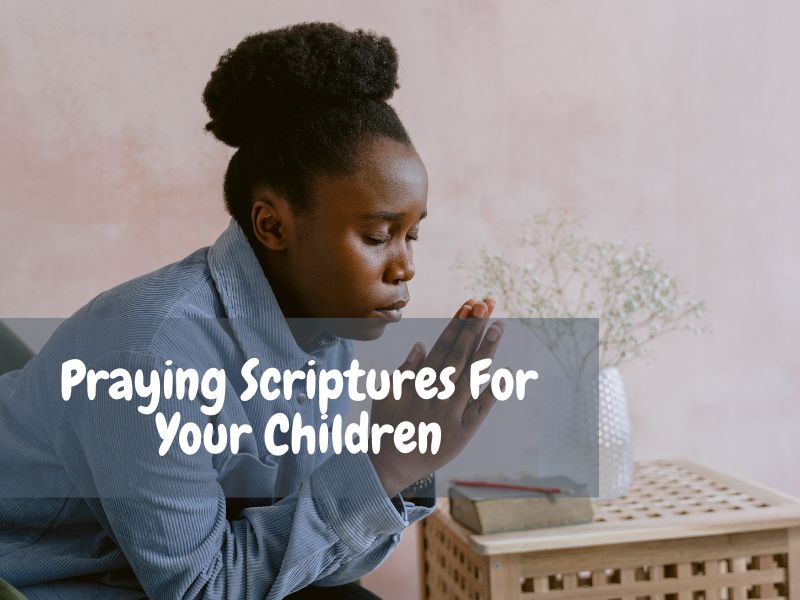Dear Friends,
This 25 Praying Scriptures For Your Children is a long-standing custom of praying for guidance, protection, and blessings for one’s children when parenting. While using the 25 praying scriptures for your children as a framework for these sincere supplications, it is a deeper aspect of this spiritual activity, prayer itself is a discipline that is universal throughout nations and religions.
The 25 praying scriptures for your children help parents and other caregivers to engage with their kids on a deeper level and build a sense of stability, love, and direction through Scripture prayer. By establishing the foundation of these prayers in the eternal truths and promises of the Bible, 25 praying scripture for your children enables parents to draw inspiration from a source that is greater than themselves and give their kids a solid grounding in faith and hope.
The 25 praying scriptures for your children help parents practice praying sacred texts for their children, which crosses religious lines and draws upon the profound knowledge contained in holy texts. In addition to shedding light on the significant influence such prayers have on children’s lives, these 25 praying scriptures also offer insight into the skill of choosing, interpreting, and personalizing these scriptures to establish a significant and transforming practice.
Praying Scriptures For Your Children
1. Psalm 31:19
“How abundant are the good things that you have stored up for those who fear you, that you bestow in the sight of all, on those who take refuge in you.”
2. Nahum 1:7
“The Lord is good, a refuge in times of trouble. He cares for those who trust in him.”
3. James 1:17
“Every good and perfect gift is from above, coming down from the Father of the heavenly lights, who does not change like shifting shadows.”
4. Psalm 145:9
“The Lord is good to all; he has compassion on all he has made.”
5. Exodus 34:6
“And he passed in front of Moses, proclaiming, ‘The Lord, the Lord, the compassionate and gracious God, slow to anger, abounding in love and faithfulness.'”
6. Romans 2:4
“Or do you show contempt for the riches of his kindness, forbearance and patience, not realizing that God’s kindness is intended to lead you to repentance?”
7. Psalm 100:5
“For the Lord is good and his love endures forever; his faithfulness continues through all generations.”
8. Nahum 1:15
“Look, there on the mountains, the feet of one who brings good news, who proclaims peace! Celebrate your festivals, Judah, and fulfill your vows. No more will the wicked invade you; they will be completely destroyed.”
9. Romans 8:28
“And we know that in all things God works for the good of those who love him, who have been called according to his purpose.”
10. Psalm 34:8
“Taste and see that the Lord is good; blessed is the one who takes refuge in him.”
11. Jeremiah 29:11
For I know the plans I have for you, declares the Lord, plans for welfare and not for evil, to give you a future and a hope.
12. Psalm 107:1
“Give thanks to the Lord, for he is good; his love endures forever.”
13. Ephesians 2:10
“For we are God’s handiwork, created in Christ Jesus to do good works, which God prepared in advance for us to do.”
14. Psalm 86:5
“You, Lord, are forgiving and good, abounding in love to all who call to you.”
15. Psalm 119:68
“You are good, and what you do is good; teach me your decrees.”
Wisdom and Understanding:

Wisdom and understanding are often interconnected concepts, yet they hold distinct meanings. Every child should be wise and have a great understanding of life and the things of life. Wisdom is the ability to apply knowledge and experience to make sound decisions and judgments. It involves discernment and insight, often gained through life experiences and reflection.
Understanding, on the other hand, refers to the comprehension and grasp of concepts, situations, or the feelings of others. It is the ability to perceive and interpret information accurately. Together, wisdom and understanding enable individuals to navigate complex situations thoughtfully and empathetically, making decisions that are not only well-informed but also considerate of broader implications.
Scripture
16. Proverbs 2:6
Lord, I pray that my children will grow in wisdom and understanding. May they seek knowledge and discernment in all they do.”
Protection and Guidance:

Your child needs spiritual and physical protection. For progress and safety to be ensured, protection and direction are crucial components. Protection entails putting safe spaces and preventative measures in place to shield people from damage, whether it be psychological, emotional, or physical. In contrast, guidance concentrates on offering direction, assistance, and counsel to assist people in overcoming obstacles and coming to wise judgments. When combined, they provide a framework of support that fosters growth and well-being, allowing individuals to flourish and accomplish their objectives while being protected from hazards and setbacks.
Scripture
17. Psalm 23:3
“Heavenly Father, I ask for Your protection over my children. Lead them in the paths of righteousness and guard them from harm.”
Love and Compassion:

Parents should teach their children how to love and show compassion. Love and compassion foster a sense of connection and solidarity among people. They help create environments where individuals feel valued, understood, and supported. Whether through small acts of kindness or profound sacrifices, these qualities enrich our lives and contribute to a more compassionate world.
Scripture
18. Colossians 3:12
“Lord, may my children abound in love and compassion for others. Teach them to treat everyone with kindness and empathy.”
Faith and Trust:
Trust and faith are closely connected words that frequently cross in everyday life. Faith is often used to describe a strong belief in something, frequently in the absence of scientific proof, and is frequently connected to religious or spiritual conviction. It entails having faith in things that are invisible or unknown, occasionally because of cultural or personal beliefs.
Contrarily, trust is the confidence placed in the goodness, competence, or moral character of an object or person. Faith is primarily about believing, whereas trust is about dependability and expectation. These ideas are basic to social institutions and human relationships, giving rise to mutual understanding and collaboration. Faith and trust work together to support people in navigating uncertainty and forming relationships with others, which promotes a sense of safety and belonging.
Scripture
19. Hebrew 11:6
“God, help my children to have unwavering faith in You. May they trust in Your plans and believe in Your goodness.”
Obedience and Discipline:

Obedient children always make us parents proud. So it is very important to ensure that our children are obedient and disciplined. Obedience is the act of following orders or instructions from someone in authority, often without question or hesitation. It involves adhering to rules and guidelines set by others, typically out of respect, duty, or fear of consequences.
Discipline, on the other hand, is the practice of training oneself or others to follow a code of conduct, rules, or standards. It often involves self-control, restraint, and a commitment to maintaining order and achieving goals. While obedience focuses on compliance with external directives, discipline emphasizes internal self-regulation and consistency in behavior.
Scripture
20. proverbs 3:11-12
“Dear Lord, instill in my children a spirit of obedience and discipline. May they willingly follow Your ways and grow in self-control.”
Joy and Peace:
Joy and peace are closely related emotional states, often experienced together but distinct. Joy is a profound sense of happiness and contentment, often arising from positive experiences, achievements, or meaningful connections with others. It is characterized by a feeling of elation and can be both momentary and enduring.
Peace, on the other hand, is a state of calmness and tranquility, free from anxiety, conflict, or disturbance. It is an inner stillness that allows individuals to navigate life’s challenges with a sense of balance and clarity. While joy brings vibrant, uplifting energy, peace offers a deep, sustaining comfort, and together they create a harmonious and fulfilling emotional experience.
Scripture
21. john 16:24
“Father, grant my children a heart full of joy and peace. Let them experience the abundant life You have promised.”
Forgiveness and Humility:
Forgiveness and humility are intertwined virtues that promote inner peace and harmonious relationships. Forgiveness involves letting go of resentment and anger towards someone who has wronged you, offering grace and understanding instead. It requires an acknowledgment that everyone makes mistakes and a willingness to move past the hurt.
Humility, on the other hand, is the recognition of one’s limitations and the acceptance that we are not superior to others. It fosters an open-mindedness to learn from others and a readiness to admit one’s faults. Together, forgiveness and humility encourage compassion, reduce conflict, and foster a more empathetic and understanding perspective on life’s challenges.
Scripture
22. Colossians 3:13
“Lord, teach my children the importance of forgiveness and humility. May they be quick to forgive and willing to serve others.”
Integrity and Honesty:
Integrity and honesty are closely related principles that form the foundation of ethical behavior. Integrity involves adhering to moral and ethical principles, being consistent in actions, and maintaining a strong sense of right and wrong, even when it’s challenging. Honesty complements integrity by emphasizing truthfulness and transparency in communication and actions.
Together, they foster trust and credibility, as individuals who demonstrate these qualities are seen as reliable and sincere. In both personal and professional contexts, integrity and honesty are crucial for building and maintaining healthy, trusting relationships.
Scripture
23. Proverbs 11:3
“Heavenly Father, help my children to walk in integrity and honesty. May their words and actions always reflect Your truth.”
Boldness and Courage:
Boldness and courage are closely related traits, but they have distinct nuances. Boldness involves a willingness to take risks and face challenges with confidence, often driven by a desire to achieve something significant or make a bold statement. Courage, on the other hand, is the mental or moral strength to persevere through fear or adversity, even when the risks or potential for failure are high.
While boldness is about proactive action and assertiveness, courage is about enduring and overcoming obstacles, often in the face of fear or uncertainty. Both qualities are essential for personal growth and achieving meaningful goals, but they manifest in different ways.
Scripture
24. Joshua 1:9
“God, give my children boldness and courage to stand for what is right. Let them be strong and courageous in the face of challenges.”
Gratitude and Contentment
Gratitude is the feeling of appreciation and thankfulness for the positive aspects of life, often leading to a greater sense of happiness and well-being. Contentment, on the other hand, is a state of satisfaction and acceptance of one’s current situation, regardless of external circumstances or material possessions.
While gratitude focuses on recognizing and valuing what one has, contentment is about finding peace and fulfillment in the present moment, often resulting in a more stable and enduring sense of happiness. Together, they create a harmonious balance where one appreciates what they have and finds joy in the present, enhancing overall life satisfaction.
Scripture
25. 1 Thessalonians 5:18
“Dear Lord, cultivate an attitude of gratitude and contentment in my children. May they appreciate Your blessings and be satisfied in You.”
Finally, these 25 praying scriptures for your children encourage the habit of praying the Bible to your kids which can be a powerful and effective approach to support their spiritual, emotional, and personal growth. The advantages and importance of these 25 praying scriptures for your children, go beyond simple words to affect a child’s life at its very core.
A unique way for parents and other caregivers to engage with their kids on a deeper level and build a sense of stability, love, and direction is through Scripture prayer. By establishing the foundation of these prayers in the eternal truths and promises of the Bible, we draw inspiration from these 25 praying scriptures for your children whose source is greater than ourselves and give our kids a solid grounding in faith and hope.
the 25 Praying the Scriptures for your children helps them develop a sense of purpose, identity, and inner strength in a world full of obstacles and diversions. The 25 praying scriptures give your children the power of prayer into everyday routines and give kids the tools they need to handle life’s challenges with grace and resiliency, which is our privilege and responsibility as parents.
The act of using the 25 praying Scriptures for your children is essentially a timeless method of communication that brings benefits, knowledge, and heavenly direction. These 25 praying scriptures for your children transcend time and cultural barriers. Let’s embrace the beauty and change that the 25 praying Scriptures for your children can offer as we set out on this journey to raise our kids’ hearts, minds, and spirits. In doing so, we will leave behind a legacy of faith.






